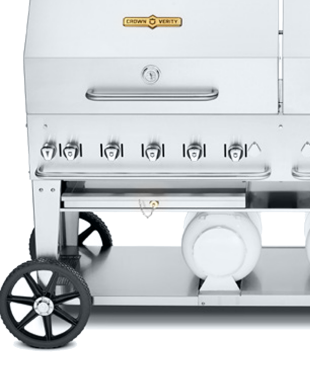Natural gas or propane? What’s better? It depends.
Roughly two-thirds of the grills on the market today use propane although natural gas is rising in popularity and is actually cheaper to buy and use long-term.
PROPANE
The major advantage of using propane is the portability option. You can move your grill to virtually anywhere you want because the tank travels with the unit. Propane also burns hotter than natural gas (2500 BTU’s vs 1000 BTUs), which some grilling purists believe is one of the most important factors to keep in mind. Propane is considered to be environmentally-friendly because there’s no lead, has low GHG emissions and produces water vapor and carbon dioxide.
On the other hand, there is the expense and time associated with having to take a tank out to be filled up and returned. (Nothing throws a cold towel on a great event faster than running out of propane just as the party’s kicking in to high gear.) Some people believe propane also creates a “wet heat” which can negatively change the texture of the food being cooked. And because propane is heavier than air (natural gas is lighter than air) it stays lower to the ground, in a more concentrated form and for longer periods of time. This makes it more dangerous in situations where fires or sparks can occur.
NATURAL GAS
Convenience, cost and environmental impact are three key points to keep in mind when considering natural gas. For starters, you’ll never have to worry about running out of gas, since your fuel is always on and accessible. Natural gas is also cheaper than propane and is considered to be a greener gas because it burns cleaner.
But there are some other factors to bear in mind when looking at natural gas. The main one is that your grill will not be portable because it’s fixed to the gas line. You might be able to get a flexible gas pipe although this still won’t give you much mobility and could present other issues at the same time. You’ll also need a professional to install the line and to hook up your grill, so your up-front costs could be high, particularly if you live some distance from a natural gas main. And, finally, as a general rule, most natural gas grills are more expensive than propane grills.
So if you’ve been wondering which one you should choose – propane or natural gas – take heart in knowing that they are both great options for grilling and will deliver excellent results. What it comes down to is being aware of your grilling expectations and how your choice of fuel will have an impact on them.
